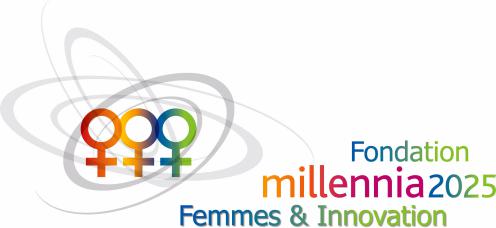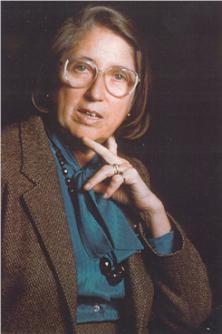_____________________________
Fondation internationale d'utilité publique
pour l'autonomisation des femmes et l'égalité
> Millennia2015 - Conférence internationale 2008 - Palais des Congrès de Liège
Accès à l'information et au savoir : renforcement des capacités pour les femmes
02-P1-2 - Session plénière d'ouverture 2 - Opening Plenary 2
Introduction et présidence : Eleonora Masini
Intervenant-e-s : Corinna Cortes - Barbara Etoa - Agnès Hubert
v Introduction et présidence
Eleonora Barbieri Masini
Membership in Professional Associations
World Futures Studies Federation (WFSF);
International Sociological Association (ISA);
Italian Sociological Association (AIS);
Club of Rome;
World Academy of Art and Science (WAAS);
World Wildlife Fund (WWF).
Roma, Italy
Main activities
Professor Emeritus of Futures Studies (Social and Human aspects) and Human Ecology at the Faculty of Social Sciences, Gregorian University, Rome (1976-2004) and at the University of Trieste, Faculty of Political Sciences;
International Studies in Gorizia, Futures Studies (1996-1998);
Secretary General of World Futures Studies Federation (1975-1980), President (1980-1990), Chair of Executive Council (1990-1993);
Coordinator of the Project "The Futures of Cultures" for UNESCO (1991-1994);
Member of the Executive Council of the Inter University Center at Dubrovnik (1984-1996);
Chairman of the Futures Research Committee of the International Sociological Association (1978-1997);
President of the World Association for Science and Arts for Europe from October( 1991 1995);
Coordinator of the Network WIN (Women's International Network) Emergency and Solidarity, sponsored by UNESCO and initiated with Prof. Rita Levi Montalcini, Nobel Prize for Neurobiology (1986-2005);
Consultant to many Intergovernmental Organizations such as United Nations University, UNESCO and UNDP.
Some publications
Women, Households and Change, UN University Press, Tokyo, 1991;
Why Futures Studies?, Grey Seal Books, London, 1993;
The futures of Cultures , UNESCO, BEP, Paris, 1994;
Rethinking Futures Studies, in Ziauddin Sardar, ed. Rescuing our Futures, Adamantine Press, Twickenham, England, 1999;
Penser le Futur, Dunod, Paris, 2000.
> Short CV [pdf] > CV pdf
v Abstract :
Millennia2015 is a unique opportunity, in a moment of great changes in socio-cultural terms, to enhance women's capacities that have had, and have, some similar traits through time although differentiated by regions of the world and cultures.
As Elise Boulding showed in her seminal publications, in 1992, “The Underside of History”, women's capacities have always been present in human history, although, invisible and not recognized. The last 100 years have been a time in which women have been trying to recognize their social value but yet, they find it difficult to be visible and struggle for to this aim in some common and many different way.
A first step towards visibility for women is that of being visible to themselves, and recognize that women have one special capability, which is that of looking into the future. The process is on and, as all human processes, it will go on but it needs re-enforcing and, adaptation to the present and future possibilities of knowing what other women are doing all over the world. At this point in time, women need to develop two crucial capacities: that of building networks among themselves as well as to use, in a creative, future oriented way, the technological tools now available.
> Présentation : Millennia2015 : Access to Information and Knowledge: Enhancing Women’s Capacities [pdf]
> Podcast : Millennia2015 : Access to Information and Knowledge: Enhancing Women’s Capacities [vidéo]
v Intervenant-e-s
Corinna Cortes
Corinna Cortes is the Head of Google Research, NY where she is working on a broad range of theoretical and applied large-scale machine learning problems. Prior to Google, Corinna spent more than ten years at AT&T Labs - Research, formerly AT&T Bell Labs, where she held a distinguished research position.
Corinna's research work is well-known in particular for her contributions to the theoretical foundations of support vector machines (SVMs) and her work on data-mining in very large data sets for which she was awarded the AT&T Science and Technology Medal in the year 2000.
Corinna received her MS degree in Physics from the Niels Bohr Institute in Copenhagen and joined AT&T Bell Labs as a researcher in 1989. She received her Ph.D. in computer science from the University of Rochester in 1993.
Corinna is also a competitive runner, placing third in the More Marathon in New York City in 2005, and a mother of two.
New York, USA
> CV [pdf]
v Abstract :
To encourage women and historically underrepresented minorities to pursue studies in Computer Science and Engineering, each year we award numerous scholarships (www.google.com/jobs/scholarships).
> Présentation : Women@Google [pdf]
> Podcast : Women@Google [vidéo]
Agnès Hubert
Conseillère du Président de la Commission européenne José Manuel Barroso, en charge des Questions de Genre, Droits Fondamentaux, Emploi et Politiques Sociales, Cohérence Interne/Externe, Bureau des Conseillers de Politique européenne (BEPA);
Bruxelles
v Abstract :
La fin du XXème siècle a été marquée par de remarquables avancées des femmes dans l'éducation et le monde du savoir, domaine longtemps réservé aux hommes. Ces progrès bien qu'inégalement partagés sont notables partout. Le nombre de diplômées de l'enseignement supérieur mais aussi d'enseignantes et de chercheuses s'est accru à la fin du XXème siècle. Non seulement les femmes ont gagné l'accès au savoir mais bien souvent ce sont elles qui le transmettent (en tant qu'enseignantes), en revanche on est bien loin de la parité en ce qui concerne la production de savoir. Prochaine frontière? D'ores et déjà des femmes scientifiques appuyées par des organisations internationales dont l'Union Européenne, s'organisent pour "genrer" la production des savoirs.
> Présentation : Accès, transmission et production du savoir par les femmes [pdf]
> Podcast : Accès, transmission et production du savoir par les femmes [vidéo]

Barbara Etoa
Journaliste éditorialiste, Ecole supérieure des Sciences et Techniques de l'Information (ESSTI); Rédactrice en chef à la Radio-diffusion et Télévision du Cameroun.
Yaoundé, Cameroun
> Podcast : Accès à l'information et au savoir : renforcement des capacités pour les femmes [vidéo]
_______________________________________
Fondation Millennia2025 Femmes et Innovation
Organisation dotée du statut consultatif spécial
auprès du Conseil économique et social des Nations Unies
(ECOSOC) depuis 2019
_________________________________
(c) https://www.Millennia2025-Foundation.org
Propulsé par hébergé par wistee.fr
hébergé par wistee.fr



